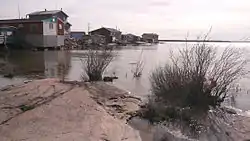
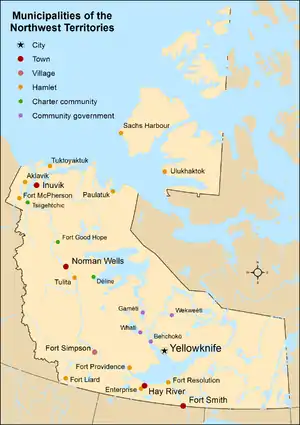
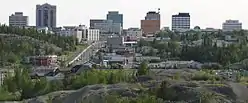
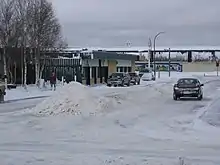
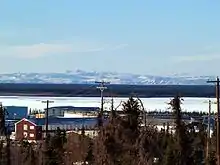
The Northwest Territories is the most populous of Canada's three territories with 41,070 residents as of 2021 and is the second-largest territory in land area at 1,127,712 km2 (435,412 sq mi).[1] The Northwest Territories' 24 municipalities cover only 0.2% of the territory's land mass but are home to 96% of its population.[1][2][3]
According to the Cities, Towns and Villages Act (CTVA), the Hamlets Act and the Charter Communities Act (CCA), all of which were enacted in 2003, a municipality is an area within a city, town, village, hamlet or charter community that was established or continued by a legislative order.[4][5][6] The Tlicho Community Government Act (TCGA), enacted in 2004, also considers community governments as municipal corporations alongside charter communities, cities, hamlets, towns and villages.[7]
Yellowknife is the capital of the Northwest Territories and its only city, while Fort Simpson is its only village. Of the remaining 22 municipalities, three of them are charter communities, four are community governments of the Tlicho people, eleven are hamlets and four are towns.[3] The CTVA, the Hamlets Act, the CCA and the TCGA stipulate governance of these municipalities.[4][5][6][7]
Half of the population of the Northwest Territories (49.5%) resides in Yellowknife, the largest municipality in the territory at 20,340 residents.[2] The least populous municipality is Enterprise with 75 residents.[2] The largest municipality by area is Fort Resolution at 452.87 km2 (174.85 sq mi), while the smallest is Gamèti at 9.04 km2 (3.49 sq mi).[2]
Cities
An application can be submitted to incorporate a community as a city under the Cities, Town and Villages Act at the request of a minimum 25 residents that are eligible electors, or at the initiative of the Minister of Municipal and Community Affairs, if the proposed city has a minimum assessed land value of $200 million or if an exception is made by the Minister.[4] The only city in the Northwest Territories is Yellowknife.[3] It had a population of 20,340 residents and a land area of 103.37 km2 (39.91 sq mi) in the 2021 Census.[2]
Towns
Like cities, an application to incorporate as a town can be submitted under the Cities, Town and Villages Act at the request of a minimum 25 residents that are eligible electors, or at the initiative of the Minister of Municipal and Community Affairs.[4] In the case of a town however, the proposed town's minimum assessed land value must be $50 million unless an exception is made by the Minister.[4] The Northwest Territories has four communities incorporated as towns.[3] Hay River is the territory's largest town by population and land area with 3,169 residents and 122.4 km2 (47.3 sq mi) respectively.[2] Norman Wells is the smallest town by population at 673 residents while Inuvik is the smallest by land area at 62.68 km2 (24.20 sq mi).[2]
Villages
The Cities, Town and Villages Act enables an application to incorporate as a village at the request of a minimum 25 residents that are eligible electors, or at the initiative of the Minister of Municipal and Community Affairs.[4] The proposed village's minimum assessed land value must be $10 million unless an exception is made by the Minister.[4] The only village in the Northwest Territories is Fort Simpson.[3] It had a population of 1,100 residents and a land area of 77.89 km2 (30.07 sq mi).[2]
Hamlets
At the request of a minimum 25 residents that are eligible electors, or at the initiative of the Minister of Municipal and Community Affairs, an application can be submitted to incorporate a community as a hamlet under the Hamlets Act.[5] Unlike cities, towns and villages, the incorporation of hamlets are not conditioned by a prescribed minimum assessed land value. Of the 11 hamlets in the Northwest Territories, Tuktoyaktuk is the largest by population with 937 residents and Fort Resolution is the largest by land area at 452.87 km2 (174.85 sq mi).[2] Enterprise is the smallest hamlet by population at 75 residents while the smallest by land area is Aklavik at 12.29 km2 (4.75 sq mi).[2]
Charter communities
An application to incorporate as a community charter can be submitted under the Charter Communities Act at the request of a minimum 25 residents that are eligible electors, or at the initiative of the Minister of Municipal and Community Affairs.[6] After consultation with community residents and groups, the application can be approved if 60% of the eligible electors vote to approve the incorporation.[6] The Northwest Territories has three charter communities.[3] Délı̨nę is the territory's largest charter community by population with 573 residents and largest by land area at 79.39 km2 (30.65 sq mi).[2] Tsiigehtchic is the smallest charter community by population at 138 residents while Fort Good Hope is the smallest by land area at 47.25 km2 (18.24 sq mi).[2]
Tlicho community governments
Four community governments were established through the enactment of the Tlicho Community Government Act.[7] Behchokǫ̀ is the territory's largest community government by population and land area at 1,746 residents and 74.96 km2 (28.94 sq mi) respectively.[2] Wekweeti is the smallest community government by population at 109 residents while Gamèti is the smallest by land area at 9.04 km2 (3.49 sq mi).[2] The fourth community is Whatì, the second largest by area (58.33 km2 [22.52 sq mi]) and population (543).[2]
List of municipalities
| Name | Status[3] | Incorporation date[8] |
2021 Census of Population[2] | ||||
|---|---|---|---|---|---|---|---|
| Population (2021) |
Population (2016) |
Change | Land area (km2) |
Population density (/km2) | |||
| Aklavik | Hamlet | January 1, 1974 | 536 | 590 | −9.2% | 12.29 | 43.6 |
| Behchokǫ̀ | Community government (Tlicho) | August 4, 2005[7] | 1,746 | 1,874 | −6.8% | 74.96 | 23.3 |
| Délı̨nę | Charter community | April 1, 1993 | 573 | 533 | +7.5% | 79.39 | 7.2 |
| Enterprise | Hamlet | October 29, 2007 | 75 | 106 | −29.2% | 305.58 | 0.2 |
| Fort Good Hope | Charter community | April 1, 1995 | 507 | 516 | −1.7% | 47.25 | 10.7 |
| Fort Liard | Hamlet | April 1, 1987 | 468 | 500 | −6.4% | 67.61 | 6.9 |
| Fort McPherson | Hamlet | November 1, 1986 | 647 | 700 | −7.6% | 53.83 | 12.0 |
| Fort Providence | Hamlet | January 1, 1987 | 618 | 695 | −11.1% | 255.49 | 2.4 |
| Fort Resolution | Hamlet | January 5, 2011 | 412 | 470 | −12.3% | 452.87 | 0.9 |
| Fort Simpson | Village | January 1, 1973 | 1,100 | 1,202 | −8.5% | 77.89 | 14.1 |
| Fort Smith | Town | October 1, 1966[9] | 2,248 | 2,542 | −11.6% | 91.21 | 24.6 |
| Gamèti | Community government (Tlicho) | August 4, 2005 | 252 | 278 | −9.4% | 9.04 | 27.9 |
| Hay River | Town | June 27, 1963 | 3,169 | 3,528 | −10.2% | 122.40 | 25.9 |
| Inuvik | Town | January 1, 1979 | 3,137 | 3,243 | −3.3% | 62.68 | 50.0 |
| Norman Wells | Town | April 12, 1992 | 673 | 778 | −13.5% | 82.09 | 8.2 |
| Paulatuk | Hamlet | April 1, 1987 | 298 | 265 | +12.5% | 63.58 | 4.7 |
| Sachs Harbour | Hamlet | April 1, 1986 | 104 | 103 | +1.0% | 272.22 | 0.4 |
| Tsiigehtchic | Charter community | June 21, 1993 | 138 | 172 | −19.8% | 47.89 | 2.9 |
| Tuktoyaktuk | Hamlet | April 1, 1970 | 937 | 898 | +4.3% | 12.66 | 74.0 |
| Tulita | Hamlet | April 1, 1984 | 396 | 477 | −17.0% | 52.28 | 7.6 |
| Ulukhaktok | Hamlet | April 1, 1984[10] | 408 | 396 | +3.0% | 120.71 | 3.4 |
| Wekweètì | Community government (Tlicho) | August 4, 2005 | 109 | 129 | −15.5% | 14.71 | 7.4 |
| Whatì | Community government (Tlicho) | August 4, 2005 | 543 | 470 | +15.5% | 58.33 | 9.3 |
| Yellowknife | City | January 1, 1970[11][lower-alpha 1] | 20,340 | 19,569 | +3.9% | 103.37 | 196.8 |
| Total municipalities | 39,434 | 40,034 | −1.5% | 2,540.33 | 15.5 | ||
| Northwest Territories | 41,070 | 41,786 | −1.7% | 1,127,711.92 | 0.0 | ||
See also
Notes
References
- 1 2 "Population and dwelling counts, for Canada, provinces and territories, 2021 and 2016 censuses – 100% data". Statistics Canada. March 14, 2022. Retrieved March 14, 2022.
- 1 2 3 4 5 6 7 8 9 10 11 12 13 14 15 16 "Population and dwelling counts: Canada, provinces and territories, and census subdivisions (municipalities), Northwest Territories". Statistics Canada. February 9, 2022. Retrieved February 19, 2022.
- 1 2 3 4 5 6 7 "List of municipalities – Northwest Territories". Statistics Canada. September 6, 2013. Retrieved January 12, 2014.
- 1 2 3 4 5 6 7 "Cities, Towns and Villages Act, S.N.W.T. 2003, c.22" (PDF) (PDF). Government of the Northwest Territories. October 1, 2013. pp. 2–3 and 6. Archived from the original (PDF) on January 12, 2014. Retrieved January 12, 2014.
- 1 2 3 "Hamlets Act, S.N.W.T. 2003, c.22" (PDF) (PDF). Government of the Northwest Territories. October 1, 2013. pp. 16 and 18–19. Archived from the original (PDF) on January 12, 2014. Retrieved January 12, 2014.
- 1 2 3 4 "Charter Communities Act, S.N.W.T. 2003, c.22" (PDF) (PDF). Government of the Northwest Territories. April 1, 2004. p. 15 and 17–18. Archived from the original (PDF) on January 12, 2014. Retrieved January 12, 2014.
- 1 2 3 4 "Tlicho Community Government Act, S.N.W.T. 2004, c.7" (PDF) (PDF). Government of the Northwest Territories. August 4, 2005. pp. 16–17 and 20. Archived from the original (PDF) on October 18, 2013. Retrieved January 12, 2014.
- ↑ Communities
- ↑ "Town of Fort Smith News (Volume 22)" (PDF) (PDF). Town of Fort Smith. September 2011. p. 2. Archived from the original (PDF) on January 13, 2014. Retrieved January 12, 2014.
- ↑ "Olokhaktomiut Community Conservation Plan" (PDF) (PDF). The Community of Ulukhaktok, The Wildlife Management Advisory Council (NWT), and the Joint Secretariat. July 2008. p. 17. Archived from the original (PDF) on May 17, 2013. Retrieved January 13, 2014.
- 1 2 "Community Profile" (PDF). City of Yellowknife. p. 30. Archived from the original on January 13, 2014. Retrieved January 12, 2014.
